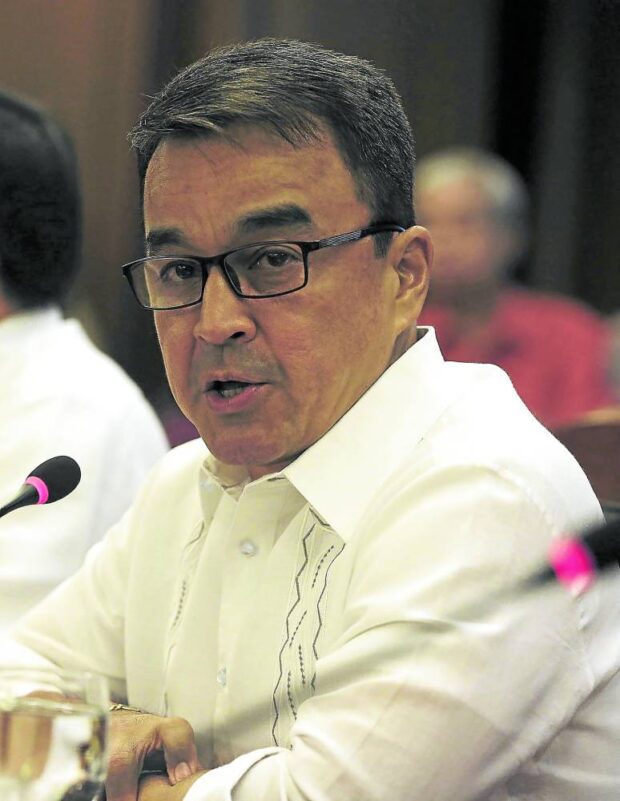
Rep. Robert Ace Barbers —Inquirer photo
MANILA, Philippines — Members of the House of Representatives’ committee on dangerous drugs were supposed to end their hearing on the drug bust in Mexico, Pampanga on Tuesday, but a revelation brought more questions than answers.
At the latter end of the hearings’ third hour, committee chairperson and Surigao del Norte Rep. Robert Ace Barbers asked Henry Bigay, President of Yatai International Corporation—which controls local electrical and light company Omni—as to why he holds a Chinese and a Philippine passport.
Bigay—who admitted to also going by the name Henry Yang—initially said that his biological mother separated from his father Yang Hua Hong, leading him to carry the surname of his mother. However, Bigay said he spent his life with his father, who raised him since he was young.
READ: P3.6-B worth of shabu seized in Pampanga warehouse
“I would just like to ask Mr. Henry Bigay […] you’re a Filipino, right?” Barbers asked, to which Bigay responded in the affirmative. “What is your passport?”
“Filipino po,” Bigay said.
“You do not have a Chinese passport?” Barbers asked again.
“I have one,” Bigay replied.
READ: Owner of warehouse storing drugs used fake identity, says Barbers
Bigay was invited to the hearing to shed light on Yatai International Corporation’s alleged links to Empire 999 Realty Corporation, a company that owns the warehouse in Mexico where the drugs were meant to be stored.
Barbers then asked Bigay how he was able to have Filipino citizenship if he also had a Chinese passport. When Bigay said that he was a dual citizen—using the Chinese passports for trips to China and the Philippine passport for other countries—Barbers and members of the committee sought the opinion of the Department of Foreign Affairs and the Bureau of Immigration on the matter.
READ: Gov’t to seize 320 properties worth billions from Chinese drug lords
Not possible
“As far as we are aware Mr. Chair, that is not possible unless the Filipino is a dual citizen by birth, which happens in certain cases Mr. Chair, like for example for Filipinos with a Filipino parent and an American parent, and when they were born, they both had a Filipino and an American citizen, then they are considered dual by birth,” Foreign Affairs Deputy Assistant Secretary Arman Talbo said.
“But if subsequently for example a Filipino born of both Filipino parents, and subsequently reacquires another citizenship, then that Filipino loses the Filipino citizenship and won’t be entitled to a passport until that Filipino reacquires through R.A. 9225 or the Citizen Retention or Reacquisition Act,” he added.
Talbo also said, after being asked by Bukidnon Rep. Jonathan Keith Flores, that the Philippines allows dual citizenship if the other country allows it.
READ: House panel asks Yang on his absence from P3.6B illegal drugs haul probe
In this case, Talbo said China does not allow dual citizenship.
Acting Chief Atty. Vicente Uncad of the Bureau of Immigration (BI) Certificate and Clearance Section meanwhile said that Bigay’s entry as a native-born individual—meaning a foreigner who was born in the Philippines—is still active.
Such a classification, Uncad explained, would only be cleared if Bigay applies for Filipino naturalization.
“According to the records of [BI], Mr. Henry Cai Yang (Bigay) started using his Chinese passport way back, his first use of the Chinese passport was on March 25, 2004. And as far as we are concerned he is still registered […] as a native-born with the Bureau of Immigration,” Uncad said.
“What is native-born?” Santa Rosa City Rep. Dan Fernandez asked.
“If you’re native-born, you still have to undergo a naturalization or any other process before you can apply for a Filipino passport […] In our records it is written native-born, and then the record is active, it was not canceled. If you apply for naturalization, be it administrative or through the Regional Trial Court, they usually cancel the registration once it is granted your Honor,” Uncad replied.
Merely a victim
Despite the revelations, Fernandez however believes that Bigay is merely a victim of his father’s schemes, noting that it might be a way to circumvent constitutional limits on foreign ownership of local companies.
“I think we need to invite the father (of Bigay), if I’m going to look deeply into the personality of this Mr. Henry Bigay, it seems he’s a victim of his father. But of course, when he renewed his passport, he already had the responsibility of answering all these questions pertaining to your true nationality,” Fernandez said.
“It’s hard for us because we know that there is a failure, there is a deception, deceiving the other agency and the other agency as well, and then when you renewed your passport three times, that is under oath, you lied to this government, and you have a responsibility to take,” he added.
The hearings of the House panel was originally about the illegal drugs tracked down by authorities from the Port of Subic in Zambales, to a warehouse in Mexico, Pampanga.
After it was eventually revealed that the warehouse was owned by Empire 999 Realty Corporation, controlled by a certain Willie Ong, the committee dug deeper and found ties to Lincoln Ong, who was also involved in the Pharmally issue.
Barbers also revealed that despite having a questionable background—having used a fake Filipino identity—Willie Ong was still able to amass 320 properties.
At the earlier part of the hearing, Bigay said he knew Lincoln Ong, as he was a former student of Bigay’s father, who was a Wushu instructor. However, Bigay said he does not know Michael Yang and many other individuals linked to the drug bust.